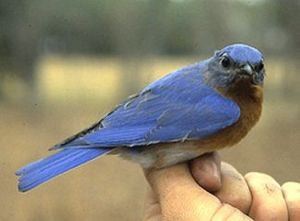 HOME: www.hiltonpond.org |
|||
- RESEARCH -
BLUEBIRD NESTBOXES
 HOME: www.hiltonpond.org |
|||
- RESEARCH -
BLUEBIRD NESTBOXES

All text & photos © Hilton Pond Center
Male Eastern Bluebird, Sialia sialis
|
Although many people have put their imaginations to work in attempting to attract bluebirds, there's no universal agreement on what makes the "best" bluebird nestbox. One design that has worked well in the Carolina Piedmont is recommended by Bill Hilton Jr., executive director of Hilton Pond Center for Piedmont Natural History. His plan includes modifications that allow easy cleaning and that deter some predators and unwanted nesters (see link below). Just as important as the box is the location in which it's placed. Eastern Bluebirds, Sialia sialis, appear to prefer nestboxes on the edges of open meadows or large lawns in which they can spot ground-dwelling insects. A nearby perch--whether it's a tree or a power line--provides a good vantage point for scoping out beetles and small grasshoppers. Placing boxes about 100 yards apart seems optimum; if they're too close together, territorial battles may ensue. Don't forget that many kinds of birds will use a box intended for bluebirds, and most of these are native species protected by state and federal laws; chickadees, titmice, nuthatches, swallows, and wrens also need cavities and should NOT be removed if they try to raise a family in your bluebird box. However, European Starlings (Sturnus vulgaris) and House Sparrows (Passer domesticus)--both of which are non-native species imported from the Old World--may occupy a bluebird nestbox and are NOT protected by law. Humans have depleted the landscape of large trees in which woodpeckers excavate cavities that, in turn get used by other hole-dwelling species. Thus, placement of large numbers of nestboxes in appropriate habitats seems to have had a positive impact on bluebird breeding success. Because they eat large numbers of insects, bluebirds are indeed friends to gardener and farmer alike, but they're well worth helping regardless. Please let us know about your own successes with bluebirds by sending an e-mail message to RESEARCH. Click here for access to a nestbox blueprint and for tips on Maintaining Bluebird Nestboxes.
You may wish to purchase a commercially available bluebird nestbox from Duncraft, an established manufacturer and distributor of bird products. If you click on their logo below and purchase products online, 10% of the sale goes to support research and education at Hilton Pond Center for Piedmont Natural History: Back to Nestbox Research |
|
Make direct donations on-line through
Network for Good: |
|
|
LIKE TO SHOP ON-LINE?
Donate a portion of your purchase price from 500+ top on-line stores via iGive: |
|
|
Use your PayPal account
to make direct donations: |
|
 post questions for The Piedmont Naturalist |
Join the |
Search Engine for |
|
|